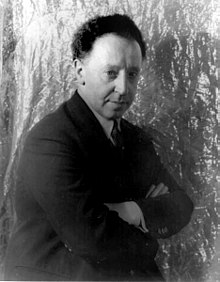Arthur Rubinstein
Polish-American classical pianist (1887-1982)
Arthur [Artur] Rubinstein KBE (January 28 1887 – December 20 1982) was a Polish-American pianist who is widely considered as one of the greatest piano virtuosi of the 20th century. He received international acclaim for his performances of the music of Frédéric Chopin, Johannes Brahms and his championing of the music of Spanish composers.

Quotes
edit- I'm a free person; I feel terribly free. They could put me in chains and I still would be free because my thoughts would be mine - and that's all I want to have.
- Quoted from a 1977 interview by Robert MacNeil in the documentary Rubinstein at 90 — reported in Alan M. Kriegsmen (January 26, 1977) "The Magic of Rubinstein ...", The Washington Post, p. B7.
- Yes, I am very lucky, but I have a little theory about this. I have noticed through experience and observation that providence, nature, God, or what I would call the power of creation seems to favor human beings who accept and love life unconditionally, and I am certainly one who does with all my heart.
- From his autobiography My Young Years (1973), quoted in Carol Krucoff (August 13, 1982) "FOCUS: With a Little Bit of Good Luck", The Washington Post, p. D5.
Attributed
edit- Music is not a hobby, not even a passion with me; music is me. I feel what people get out of me is this outlook on life, which comes out in my music. My music is the last expression of all that.
- John Guinn (December 22, 1982) "Rubinstein Was His Music", Detroit Free Press, p. 8D.
- We don't know happiness without unhappiness, gaiety without sadness, and happiness can only be felt if you don't set any conditions.
- Statement made to a correspondent in Paris in 1976 — reported in John Callcott, United Press International (December 21, 1982) "Arthur Rubinstein, At Age 95; Concert Pianist and Bon Vivant, Boston Globe.
- ...in his fingers he has more skill than any of the rest of us.
- Rubinstein remarking on a performance by Maurizio Pollini — reported in Joanne Sheehy Hoover (March 13, 1981) "Captain Of the Keyboard", The Washington Post, p. C1.
About
edit- God bless him. He will be remembered forever.
- Alexander Schneider — reported in Lon Tuck (August 29, 1983) "Emperor at the Keyboard", The Washington Post, p. C1.
- Just meeting Rubinstein was a thrill for any pianist. He was a real link to tradition in western piano music. He was a friend of Rachmaninoff and he knew Debussy. The man was an inspiration to three generations of pianists.
- Emanuel Ax — reported in Joseph McLellan (December 21, 1982) "Concert Pianist Arthur Rubinstein Dies at 95", The Washington Post, p. A1.
- Rubinstein was wonderful. For three days he spent hours playing the piano in my room, and then asking me what I thought of this and that. After a while he told my mother that I had talent and he thought I should be a musician.
- Antonio de Almeida — reported in Paul Hume (July 28, 1981) "Odyssey Of a Conductor", The Washington Post, p. C4.
- I liked him [Rubinstein] as a pianist. He was a good musician and had a fantastic repertoire. He never had a great technique, but certain things he played well. I heard him play some of the Chopin etudes, the easier ones with great panache and I told him I had never heard them played better. He said, "Do you mean it?" and I said, "Yes, I do mean it."
- Vladimir Horowitz, quoted in Harold C. Schonberg, Horowitz: his life and music (1992)
- Rubinstein was jealous of anybody who had a great success. He was jealous of the Beatles and kept on talking about their tremendous success. When Toscanini died there was a big service in St. Patrick's Cathedral presided over by Cardinal Spellman. Then after a month the body was sent to Milan where there was another big funeral. Rubinstein could not get over it. "Like a king!" he told me and Wanda. "He had two funerals!" He didn't like Paderewski, he didn't like Rachmaninoff, he was always criticizing everybody.
- Vladimir Horowitz, quoted in Harold C. Schonberg, Horowitz: his life and music (1992)
- Rubinstein was a marvelous pianist, but entirely different than Horowitz. Rubinstein needed a piano where he would feel some resistance in the action, and which had a much warmer or broader sound, or a deeper, darker sound. A Horowitz piano is much more focused; the sound is much more brilliant.
- My father, good or bad, mistakes or no, had a direct line from his heart to the music to the people, to the audience. He played with logic and his own inner truth.
- John Rubinstein — reported in Kevin Kelly (February 22, 1981) "Rubinstein a Chip Off Rubinstein: John Says His Father's Music Shaped His Approach to Acting", Boston Globe.
- Arthur Rubinstein once said to me that he couldn't think when he played, that something else took over. I also don't think when I play - something happens through me, but I am motivated by what I have thought before.
- Leonard Shure — reported in Richard Dyer (April 21, 1980) "Shure: Looking Back on the first 70 Years", Boston Globe.
- Others may be regularly more flashy, though few can dazzle so dependably; and none can match him for power and refinement. He plays very loudly and very beautifully, very softly and thoroughly clean, straightforwardly, elegantly, and with a care for both the amenities of musical discourse and the clear transmission of musical thought. He is a master pianist and a master musician. There has not been his like since Busoni.
- Virgil Thomson, "King of Pianists" (1949)